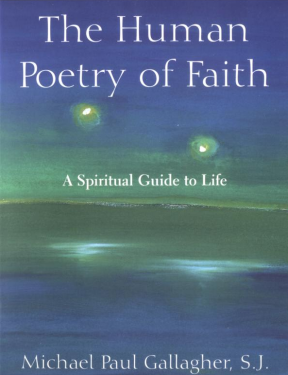This is the eighth column in a series.
 IN “THE HUMAN Poetry of Faith: A Spiritual Guide to Life” (New York: Paulist Press, 2001, pp. 142), Father Michael Paul Gallagher, S.J., tries to broaden imaginations so that people might be more receptive to the Good News of Jesus.
IN “THE HUMAN Poetry of Faith: A Spiritual Guide to Life” (New York: Paulist Press, 2001, pp. 142), Father Michael Paul Gallagher, S.J., tries to broaden imaginations so that people might be more receptive to the Good News of Jesus.
He believes that many people are not encouraged to reflect deeply on their lives and interests, on what really matters to them and how they are directing their lives. If we don’t see our radical finitude, our profound poverty as persons and our need for God, then we might not be receptive to the Good News of Christ.
In sections of the book, Father Gallagher imagines dialogues between famous and influential authors. The dialogue that he imagines between St. Therese of Lisieux and Friedrich Nietzsche I found fascinating.
Though he uses some direct quotes from Therese and Nietzsche, Father Gallagher makes clear that the dialogue between them is completely imaginary. During their lives neither even knew of the other’s existence. Though I have taught the philosophy of Nietzsche for more than 30 years, I have gained some new insights from Father Gallagher.
I have also learned more about Therese. For example, I did not know that for the last two years of her life she suffered terrible temptations against faith. My image of Therese has always been of her living a quiet, peaceful and serene life, trusting in God and practicing what she called the “little way” to God. That she experienced a sense of God’s absence makes the imagined dialogue between her and Nietzsche more interesting.
In the history of philosophy Nietzsche is known as the one who announced the death of God. He did not mean that there was a god who died. Nietzsche was an atheist. When he claimed that God died, he meant the idea of God no longer was deeply meaningful to people. Insisting that the idea of God no longer challenged people, Nietzsche has no respect for Christians though he did admire Jesus.
On this Father Gallagher writes the following:
“It is clearly false to Nietzsche to portray him as a closed and bitter atheist. If the true picture of him is closer to prophetic critique of religion than is often thought, the real Therese is very far from the image of her as the ‘Little Flower,’ simply the advocate of an attractive ‘little way’ of childlike trust and innocence. As other writings of hers emerged in the decades after her death, her story changed. She is known to have experienced a painful eclipse of faith in her last two years. And it was during this time of trial…that she felt called, as she put it, to sit at the table of non-believers and to share their ‘bread of pain.’” (p. 75)
Why did God allow this to happen to Therese? Perhaps because of it she was able to understand better the experience of those who don’t believe in God and apparently live without faith. Father Gallagher points out that the experience led her to see unbelievers as “brothers” and to share with them the absence of feeling the presence of God, which absence of feeling she embraced in a missionary spirit on their behalf.
What I especially like about the imagined dialogue between Therese and Nietzsche is that it can remind us that our feelings toward God are not the same as our faith in God. Probably many of us at some time have experienced dry spells in our relationship with God, feelings that God is distant. Those omens may challenge our faith and our awareness of our commitment to God. Perhaps they are moments when God is calling us to a deeper commitment. It might be that the very experience of distance is an opportunity to love more deeply without the consolation of an emotional feeling of being close to God.
The imagined dialogue can remind us that we are called to trust in God when everything in our lives seems to be going well and when it seems as though nothing is going well. We are called to trust in God unconditionally.
Father Robert Lauder, philosophy professor at St. John’s University, Jamaica, is the author of “Pope Francis’ Spirituality and Our Story” (Resurrection Press).
